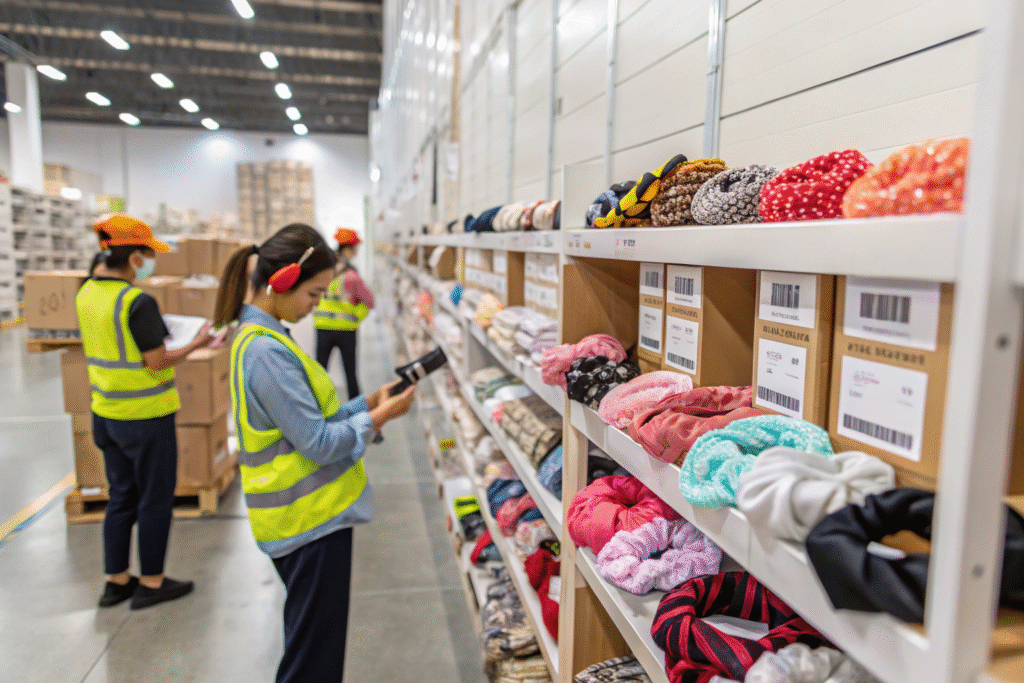In today’s fast-paced fashion and retail industry, many buyers struggle with stock errors, delays, and lost sales caused by inefficient inventory management. Traditional barcode systems are no longer enough to meet the growing demands of e-commerce, multi-channel distribution, and modern retail. Retailers and distributors are searching for smarter solutions to ensure accuracy, reduce losses, and improve supply chain visibility.
Sourcing hair accessories with RFID tracking is one of the most effective ways to control inventory at the item level. By combining trendy fashion products with advanced RFID technology, buyers and brands can gain real-time visibility of every piece of stock from the factory floor to the retail shelf. This integration is no longer reserved for luxury brands—it is now becoming accessible for hair accessories wholesalers, e-commerce sellers, supermarkets, and gift shops.
Many fashion buyers already know that RFID is the backbone of efficient supply chains in global retail. The next step is learning where and how to source RFID-enabled hair accessories, what benefits it brings, and which suppliers can provide reliable OEM/ODM solutions. Let’s explore the best strategies together.
Why RFID Hair Accessories Are in High Demand?
Integrating RFID with hair accessories might sound like a futuristic idea, but it is already reshaping the way global fashion businesses manage their stock. For wholesalers, distributors, and retailers, this innovation addresses common pain points and unlocks new opportunities.
Hair accessories with RFID tags are increasingly demanded because they bring speed, accuracy, and reliability into every stage of the supply chain. From preventing shrinkage to enabling omnichannel retail, RFID is now seen as a necessity rather than a luxury.

What Problems Does RFID Solve in Hair Accessories?
Traditional inventory systems rely heavily on manual counts or barcode scanning. These methods are slow and prone to human error. RFID solves these issues by offering real-time visibility and automated tracking.
- Eliminates stock discrepancies between warehouse and POS.
- Supports anti-theft measures by triggering alerts if items exit without authorization.
- Accelerates stocktaking—staff can scan hundreds of items in seconds.
For deeper insights, the National Retail Federation explains how RFID boosts retail accuracy across fashion segments. Another useful guide is provided by GS1, the global standardization body for RFID adoption.
How Does RFID Improve Business Efficiency?
RFID doesn’t just prevent problems; it actively improves business operations. Hair accessories tagged with RFID can be seamlessly integrated into ERP and POS systems, allowing real-time synchronization across multiple sales channels. This helps retailers run buy-online-pick-up-in-store models, ship-from-store solutions, and reduce overstocks.
A case study from Avery Dennison highlights how global brands benefit from RFID-enabled apparel and accessories. Another excellent source is Impinj, which explains how RFID readers and gateways connect physical items to digital systems.
Which Suppliers Provide RFID-Enabled Hair Accessories?
The global supply chain for hair accessories is strong in China, but not every factory is capable of integrating RFID technology. To succeed, buyers must connect with specialized partners who can combine fashion design with RFID-enabled production.
The best approach is to work with a professional hair accessories manufacturer and pair them with RFID solution providers to deliver finished RFID-ready products. This way, buyers receive not only fashionable designs but also cutting-edge technology for inventory control.

Can RFID Tags Be Embedded During Manufacturing?
Yes, RFID tags can be integrated directly during the production of hair accessories. Factories can sew or embed RFID inlays into product packaging, hang tags, or even into decorative elements like fabric labels. This method ensures durability and seamless appearance.
For example, Checkpoint Systems specializes in RFID item-level tagging and collaborates with apparel factories worldwide. Similarly, Tageos produces eco-friendly RFID inlays that can be embedded into fashion accessories.
By embedding tags during manufacturing, brands gain full control of inventory without adding complexity at retail.
Which Platforms List Verified Suppliers?
For global buyers, sourcing starts from well-known B2B marketplaces. Platforms such as Made-in-China and Global Sources host thousands of verified manufacturers of hair accessories.
Some suppliers also list RFID-ready customization services. For instance, Seiko Tags offers accessory RFID solutions adaptable for clips, headbands, and scarves. Another practical option is Pollux Enterprise, known for flexible OEM production and compliance with international standards.
What Are the Benefits of RFID for Fashion Buyers?
Buyers like Ron from the US often ask why RFID is worth the investment. The answer lies in long-term efficiency, reduced shrinkage, and smoother logistics. For businesses handling thousands of SKUs, RFID creates measurable financial benefits.
RFID benefits fashion buyers by increasing stock visibility, reducing losses, and supporting fast replenishment cycles. These advantages directly translate to higher sales and lower costs.

How Does RFID Reduce Tariff and Logistic Pressures?
For American and European buyers, tariffs and logistics costs are major concerns. RFID helps by streamlining customs clearance and improving shipment accuracy. RFID-tagged products can be easily verified during cross-border inspections, which reduces delays.
The World Customs Organization provides insights into RFID’s role in customs facilitation. Additionally, Accenture reports how RFID enhances transparency in international trade and logistics.
When combined with efficient suppliers in China, RFID becomes a tool not just for inventory but also for overcoming tariff and shipping inefficiencies.
Does RFID Support Omnichannel Retail Strategies?
Yes, RFID is a crucial enabler for omnichannel. It ensures stock accuracy across online stores, physical outlets, and warehouses. This allows buyers to manage buy-online-pick-up-in-store (BOPIS) or direct drop-shipping without errors.
The Harvard Business Review covers how RFID is revolutionizing retail by supporting omnichannel logistics. Another detailed analysis from Vogue Business shows how brands like Nike and Mango rely on RFID to manage global supply chains.
How to Get Started with RFID Hair Accessories?
Moving into RFID-enabled sourcing requires careful planning. Buyers must understand their needs, test solutions, and partner with reliable factories and RFID providers to avoid costly mistakes.
The most effective way to start is with a small pilot order of RFID-enabled hair accessories, followed by scaling to full collections after testing. This reduces risk and provides clear proof of ROI.

What Steps Should Buyers Follow?
- Define requirements: Decide if tags should be embedded in packaging, labels, or products.
- Contact RFID providers like Impinj for hardware and encoding solutions.
- Work with a reliable factory such as Headdecor to produce RFID-ready accessories.
- Run a pilot batch and test readability, durability, and ERP integration.
- Scale up production with consistent quality checks.
These steps ensure smooth adoption and prepare buyers for long-term competitive advantage.
Who Can Support with OEM & ODM Services?
OEM and ODM suppliers in China play a vital role in integrating RFID with fashion products. Many already have partnerships with RFID companies and can provide packaging, embroidery, and dyeing support.
For example, NihaoWholesale offers large-scale customization and international logistics services. Meanwhile, Alibaba lists verified vendors offering RFID-compatible accessory production.
By choosing the right partner, buyers can focus on branding and sales while suppliers handle technology integration.
Conclusion
RFID is no longer just a trend; it is a practical solution transforming how fashion buyers manage their inventory. Hair accessories with RFID tags bring accuracy, security, and efficiency from factory to retail. Buyers can work with global RFID providers, verified Chinese manufacturers, and trusted OEM partners to source customized RFID-enabled hair accessories. This innovation not only solves inventory headaches but also supports omnichannel strategies and cross-border logistics.
If you are ready to explore sourcing RFID-enabled hair accessories, you can partner with Shanghai Fumao. We are a large-scale head accessories manufacturer with strong OEM and ODM capabilities, a professional QC team, and cooperative RFID integration support. To discuss your order, please contact our Business Director Elaine at elaine@fumaoclothing.com. We look forward to building your next successful collection.









